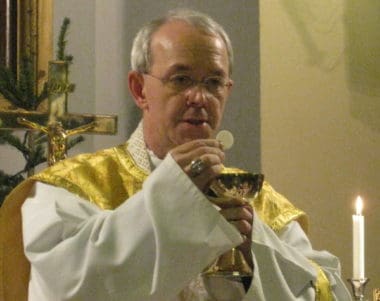One Priest’s Thoughts and Experiences
Concerning Communion on the Tongue
Part II

Editor’s Note: In Part I, Fr. Jerabek introduced the topic of receiving Holy Communion on the tongue, the dangers of inadvertent–and sometimes purposeful–profanation present in receiving Communion in the hand, and why there seems to be less regard for how we receive Our Lord these days. Today, in Part II, the author discusses whose hands are consecrated for handling the Blessed Sacrament, what other priests and bishops think of the practice of receiving Holy Communion in the hand, and provides recommendations (and links) for further reading.
Among the other reasons in favor of Communion on the tongue, there is also the fact that the priest’s hands – and his alone – are consecrated for the sake of handling the Most Blessed Sacrament. Unfortunately, in recent decades the practice has been approved of allowing lay people to handle the Blessed Sacrament as extraordinary ministers of Holy Communion; this is regrettable inasmuch as their hands are not consecrated for this purpose. And some may claim that because lay people can now handle the host, therefore everyone should be able to receive in the hand. Yet note well: those who function as extraordinary ministers are given a mandate by Church authority to do so, and are (or should be) provided with training as well.
As I said, I am certainly not the only one who is bothered by Communion in the hand. Many priests share this concern; even a few bishops. Some people suppose that I am scrupulous, given my worry about this matter at all or the care I take, for example, in purifying the sacred vessels: I take great care to remove all of the visible particles of the Precious Body and drops of the Precious Blood that remain. Besides those who flippantly chide me about how I “do the dishes” (they are not dishes!), I have been reprimanded by brother priests and even a bishop. People will say things like, “Jesus is a big boy; he can take care of himself! Don’t worry so much!” This is true. Christ is very great indeed – but in the Blessed Sacrament, he becomes very small and very fragile and he entrusts himself to our care.

Among the very few bishops who have spoken out against the practice of Communion in the hand is Bishop Athanasius Schneider – an auxiliary bishop in Kazakhstan. He has written at least two books on the subject, one of which is entitled, Corpus Christi: Holy Communion and the Renewal of the Church. In this excellent and concise book, the good bishop presents convincing arguments as to why our current practice and form of Communion in the hand is both imprudent and unprecedented. Maybe “imprudent” is too light of a word: it is offensive to God and is hindering authentic renewal in the Church!
Bishop Schneider also published another excellent book on this subject: Dominus Est! It is the Lord! Reflections of a Bishop of Central Asia on Holy Communion. I cannot recommend this little book highly enough. In it, he recounts the story of the “Eucharistic women” who, living during times of communist persecution, safeguarded the Eucharist and handed on to countless others a proper belief in and reverence towards the Most Blessed Sacrament. He also argues in this book why the practice of receiving Holy Communion in the hand is to be discouraged and, if possible, abrogated. If you would like to read some inspiring stories about the sacrifices that holy people made to protect the Eucharist, and grow in your faith, I very much recommend this brief book.
The Church does give us the right – in the United States and in some other countries – to receive Holy Communion in the hand. But, as Bishop Schneider says, our Lord Jesus Christ has rights also: above all, to be treated with the respect and adoration that belong to the Divinity. If you were to ask me, I would advise you against ever receiving Holy Communion in the hand. I encourage all to receive Holy Communion not only worthily (i.e., in the state of grace) but also on the tongue.
O Sacrament most holy! O Sacrament divine! All praise and all thanksgiving be every moment thine!
Father Bryan W. Jerabek, J.C.L. is Rector of the Cathedral of St. Paul in Birmingham, Alabama and is Chancellor of the Diocese of Birmingham. He blogs at http://fatherjerabek.com.
+
Art for this post on Communion on the Tongue: Partial restoration of San Carlo Borromeo comunica San Luigi Gonzaga (St. Charles Borromeo communicates St. Aloysius Gonzaga), tapestry by unknown artist, photographed by Giovanni Dall’Orto, June 22, 2007, copyright holder allows use for any purpose, provided copyright holder is properly attributed; Detail of Bishop Athanasius Schneider O.R.C. celebrating Traditional Latin Mass in Tallinn, Estonia, photographed by Marko Tervaportti, 10 December 2009 own work; both Wikimedia Commons.




